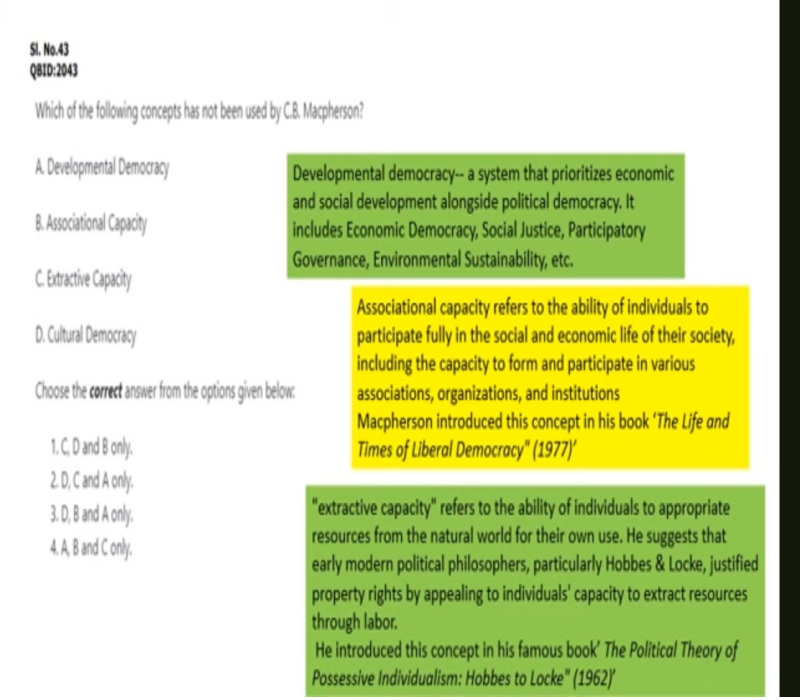2024-12-24
Concepts of Western Political Theory
Justice as Mutual Advantage
David Gauthier
Theory that argue that moral norms of justice are those that rational, self‐ interested persons would accept in regulating the pursuit of their self‐interest.
Justice gives everyone, as the rational, self-interested person, the best chance of achieving their good that they can reasonably expect, given that others are simultaneously trying to achieve their (different) good
Negative and Positive peace
Negative Peace: simply absence of violence, physical threat
Positive Peace: Societal structure providing equal opportunity, dignity, and status to all its member
Johan Galtung wrote
- Peace by peaceful means(1996)
Michael Doyle
Is an American international relations scholar who is a theorist of the liberal "democratic peace".
Book
- Liberalism and World Politics
Anthony Downs
book
- An Economic Theory of Democracy (1957)
The book gives a model of how economic theory can be applied to non-market political decision-making, such as public policy. Much of his research eventually became integrated into public choice theory- how public policy is outcome of rational choice of set of individuals who are rational and self-interested.
Joseph Schumpeter
He was critical of classical democracy and defined democracy merely as political method to choose ruler through periodic election.
Books
- Capitalism, Socialism and Democracy - 1942
Robert Nozick
Libertarian thinker, for him welfare state is like slavery as taxation is like forced labor.
Book
- Anarchy, State, and utopia - 1974
Labor Theory of Property
John Locke
David Hume's empiricism
He focus on feeling and emptions over reason/rationality
Thomas Carlyle (1795-1881)
- Criticized Bentham’s Philosophy as “Pig Philosophy”;
- A polemicist;
Hegel
- Family is the thesis, Bourgeois society is the anti-thesis and the State represents synthesis;
- The rational is real and the real is rational;
- Contradictions are not obstacles preventing us reaching truth;
- Societal common Good is preferred over rights of individual;
- State was march of God on earth;
- He gave organic and integrative theory of state- state as organism, individuals as its limbs/organs
- He support corporatist state;
Book
- Elements of the Philosophy of Rights - 1820;
Proudhon
- State is an unnecessary evil;
- Property is theft
- Mutualism
Book
- Philosophy of Poverty

Irish Marian Young
Democracy and difference
Thomas Pogge
Global Justice/cosmopolitanism
William Thomson
Books:
- Elements of Natural Philosophy - 1885
R.M. MacIver
State was simply one association among the rest
Thomas Aquinas
(1225-1274)
was one of the most influential political thinker of medieval period in Europe. He held Theological (religious) views on politics
Book: Summa Theologica
- He argued that God is the source of both the light of natural reason and the light of faith;
- According to him man's ultimate happiness consists in Contemplating God;
- He gave 5 proof of ‘existence of God’;
Principle of medieval Secularism
Principle of medieval Secularism was formulated by Marsilio of Padua (1275 – 1342), who in his book Defensor Pacis (The Defender of Peace)- supported separation of temporal power (king) from spiritual power( church)
Concept of Cultural Capital
Pierre Bourdieu's concept of cultural capital refers to the collection of symbolic elements such as skills, tastes, posture, clothing, mannerisms, material belongings, credentials, etc. that one acquires through being part of a particular social class
Social capital
Pierre Bourdie, Robert Putnam, James Coleman gave the concept of ‘ Social capital’
Harold Lasswell
- Politics is the process of allocation of scarce resources;
- Politics is the study of influence and influential;
- Father of "Policy Science", started by him in 1950s;
Books:
- Politics: Who Gets, What, When, and How - 1936;
St Augustine
- Founding father of Christianity;
- He made distinction between "City of God" and "City of Man";
- If justice taken away, state becomes band of robbers;
Books:
- The City of God - 426 AD; divided into 22 books;
Henri de Saint-Simon
inspired and influenced utopian socialism, such as Pierre-Joseph Proudhon, liberal political theorist John Stuart Mill, and of course Karl Marx and Friedrich Engels
Thinkers who declared demise of (normative) political theory
"Lazy Dogs Run After Germs"
- Peter Laslett - political theory is dead;
- Robert Dahl;
- Reimer- political theory in doghouse;
- Alfred Cobban;
- Dante Germino;
David Hume
- Modern era thinker was empiricist, claiming that experience is source of knowledge, not reason/rationality;
- He influenced utilitarianism and logical positivism;
- Philosophy as the inductive, experimental science of human nature;
Books:
- A Treatise of Human Nature;
Ernest Barker
- Termed Bentham as the prophet of empty liberty and abstract individual.
- Critic of Plato
Books:
- Social and Political theory
- Greek Political Theory
- Modern theory of nationalism